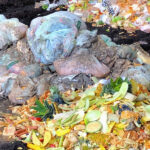Nora Goldstein
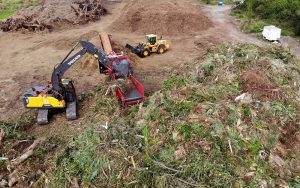
Aerial view of Indian River County’s yard trimmings composting site. Photo courtesy of Atlas Organics, Inc.
On December 10, 2019, Atlas Organics, Inc., an organics hauler and composter based in Spartanburg, South Carolina, announced it received $21.4 million in project development capital from Spring Lane Capital (SLC). “This investment gives us dedicated infrastructure capital to design, build, and operate composting facilities for public and private partners to provide much needed organics recycling infrastructure,” explains Joseph McMillin, Chief Executive Officer of Atlas. “The capital commitments are ideal for Atlas as we look to develop and operate small to mid-scale compost manufacturing facilities in multiple geographic areas across North America.”
Atlas operates composting sites for the city of Durham, North Carolina (both yard trimmings and biosolids composting) and Greenville County, South Carolina (yard trimmings and food waste), and recently won the bid for Indian River County, Florida’s new yard trimmings composting facility. It utilizes extended aerated static pile composting at all of its facilities. The company also collects organics from the commercial, residential and industrial sectors that are processed at the Greenville County site.
Spring Lane Capital focuses its project financing investments on smaller-scale distributed solutions in the energy, food, water and waste sectors. “We identified a gap in the financing market where early stage companies have established commercially proven solutions using venture funding, and hit the point where they need to raise project capital to fund infrastructure and equipment,” notes Nikhil Garg, General Partner at SLC. “This isn’t a stage that traditional venture investors are well-suited to fund, as the asset-intensive needs aren’t a good fit for their mandate.” SLC provides investments in the $10 million to $25 million range.
McMillin and Atlas Organics’ cofounder Gary Nihart, Chief Operating Officer, both became involved with food waste recycling while in college. Nihart was more focused on composting, whereas McMillin was involved in collection. They were introduced through a mutual friend, and decided to collaborate — starting with food waste collection while seeking a site to start a composting facility. The pair tried to get capital, but was rebuffed.
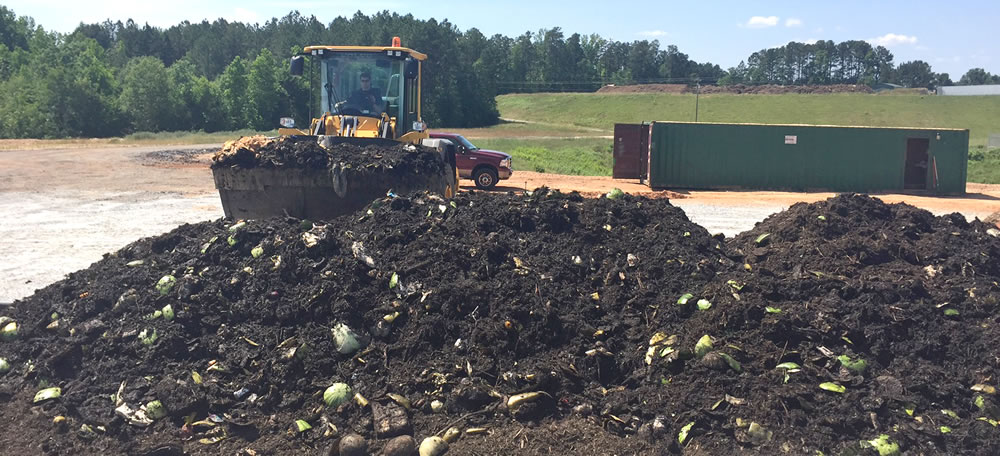
Food waste and yard trimmings are composted at Greenville County’s Twin Chimneys facility, Atlas’s first composting operation. Photo courtesy of Atlas Organics, Inc.
Despite a lack of funds to develop its own facility, the entrepreneurs secured a contract with Greenville County Solid Waste to build and operate a composting site at its Twin Chimneys Landfill in Honea Path (SC). “We had a public-private partnership, but no money,” recalls Nihart. Eventually, VentureSouth, a syndicate of angel equity investors, provided Atlas seed funding at the end of 2015, in exchange for an undisclosed percentage of the company. Atlas did site improvements, including grading and installation of a 100-foot by 200-foot impermeable pad constructed of engineered layers of clay and gravel. The facility was permitted to accept pre and postconsumer food waste. It opened in May 2016, and at the end of 2017, was processing about 8,000 tons/year. Since then, the Twin Chimneys site has diverted over 24,000 tons of food waste and yard trimmings from the landfill.
Honing The Business Model
Twin Chimneys gave McMillin and Nihart experience with the public-private partnership model for composting infrastructure development, and they began to pursue more opportunities. Atlas Organics raised two more rounds of venture capital for the corporate entity from Closed Loop Ventures, Gratitude Railroad and other investment firms across the U.S. “We seek investors who bring strategic value in addition to capital,” explains McMillin. “We have a very productive group of people working with us.”
The next opportunity materialized in Durham, North Carolina. The City of Durham had an existing, permitted Large Type 1 Solid Waste Compost Facility wood waste and yard trimmings recycling operation, and wanted to divert a greater volume of yard trimmings, and integrate food residuals and biosolids. Atlas assisted Durham with its application for a permit modification to switch from windrow composting to extended aerated static piles. Atlas Organics was awarded an 11-year contract to manage the city’s composting operations. “The Type 1 facility, on about 5 acres of city-owned property, has been up and running for 19 months, and is permitted to receive 15,000 tons/year of yard trimmings,” says Nihart. “Our infrastructure investment was primarily electrical to operate the aeration system.”
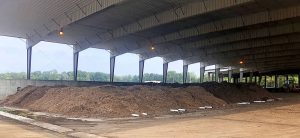
City of Durham, North Carolina’s recently opened biosolids composting facility. Photo courtesy of Atlas Organics, Inc.
Atlas helped the City of Durham apply for and obtain a Type 4 permit for a 50,000 tons/year biosolids composting facility that can also take in pre and postconsumer food waste. “Operations began on December 2,” adds Nihart. “The City of Durham is doing a very small residential food waste collection pilot, which may amount to less than 1,000 lbs in total. Long-term, we have the ability for a much larger program.” With both facilities, Atlas can accept material from sources other than the City of Durham, e.g., yard trimmings from landscapers. The company decided not to offer organics collection in the Raleigh-Durham region because service is already established there.
The Indian River County contract started on January 2. The county’s RFP was for management of the existing wood waste grinding operation, along with development of a composting component. “The Indian River Eco District (private) owns a parcel of land adjacent to the Indian River County yard waste processing facility that used to house a defunct ethanol plant,” explains McMillin. “The site is connected via a short road to the yard waste processing site where the grinding operations occur. We are repurposing 10 acres of a storage pad within the Indian River Eco District into a composting pad. In addition to yard trimmings, the facility will eventually process pre and postconsumer food waste from around the area. The site is designed for up to 175,000 tons/year of material with an average of 76,000 tons/year committed from Indian River County.”

Yard trimmings are sized reduced in a Rotochopper horizontal grinder. Photo courtesy of Atlas Organics, Inc.
At all of its sites, Atlas Organics is responsible for equipment procurement and engineering and design. The company recently hired Jorge Montezuma, a licensed professional engineer, who will support design, permitting, compliance, operations and project management for Atlas’ composting projects, as well as offer technical assistance to public and private organizations. “For the past 9 years, I’ve worked in both the public and private sectors, so understand how to approach and work with a variety of organics recycling projects,” notes Montezuma. “We are now able to provide a suite of services, from how to transition an operation from yard trimmings only to taking full advantage of all available organic waste streams, to designing a site and obtaining permits.”
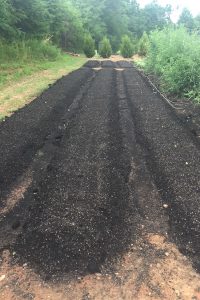
Raised beds incorporate compost produced by Atlas Organics. Photo courtesy of Atlas Organics, Inc.
At both Twin Chimneys and Durham, Atlas markets the compost and retains the revenue from sales. The largest buyer of Atlas’ compost is the agricultural sector. Bulk sales to landscapers and soil blenders are the second largest market. In the Durham region, Jim Davis, the company’s Vice President of Strategic Development, worked with several cattle and dairy operations to provide low cost composted material to improve soil organic matter and microbial activity in pastures. These projects are ongoing and should produce results as the farm operations incorporate and measure the efficacy of the compost amendment. The goal is to improve overall soil health that supports total farm health.
Hemp growers are another emerging market. Atlas Organics partnered with Dr. Allison Justice and her family who own and operate The Hemp Mine in Fair Play, South Carolina. The initial pilot in the latter part of the 2019 hemp growing season was conducted to get a basic understanding of whether compost application would impact overall desirable cannabinoids and thus increase financial return. The data is being compiled; initial results appear to be mixed, but The Hemp Mine has agreed that a scaled-up experiment should be implemented for next year’s planting season.
Facility Financing
From a facility financing perspective, Atlas has positioned itself to build new composting sites and acquire existing ones, as well as manage municipal operations. “Our business model is to be a comprehensive organics recycling platform,” says McMillin. “The fact that we can finance these projects and have capital to do so is a big differentiator. For public-private partnerships (P3s), the municipality usually controls the material flow and Atlas underwrites the projects because we have feedstock guarantees. Many times, with P3s, the municipality has access to land or facilities that needs to be repurposed. That approach — using existing sites and infrastructure — makes the tipping fee we charge in our contracts reasonable for municipalities.”
Its latest round of financing with Spring Lane Capital enables Atlas Organics to offer project level financing (previous investments were in the corporate entity). “The $21.4 million allows us to build infrastructure projects for municipalities, or if we want to develop a facility outside of a P3 contract,” notes Nihart. “Spring Lane’s investment is dedicated infrastructure capital that Atlas can pull down — we have the $21 million in committed capital with a follow-on of $10 million. With each individual project, Atlas Organics and Spring Lane Capital create special purpose vehicles in separate LLCs, then provide the equity that can be leveraged with debt. Essentially, it is an equity investment at the project level.”
McMillin adds there are a limited number of firms that do fixed asset investments in the impact investing space, and even fewer that invest in the waste, composting and food service sectors. (Impact investments are funds intended to generate a measurable, beneficial social or environmental impact alongside a financial return.) “Atlas was one of the first to try to source this kind of capital,” he says.
“We got connected with Spring Lane from our corporate level investors and quickly formed a really good working relationship.” The first deployment of capital from this funding was to support Atlas’ projects in Durham and Indian River County.
Reflecting on broader investor interest in the organics recycling space, the key is to have a contracted revenue stream that can be underwritten, e.g., a 10-year contract on 70,000 tons/year of incoming feedstock. “So far, our projects are underwritten on feedstock commitments, but we have one in the pipeline that is committed on the compost market side,” says Nihart.
The second installment of this article on January 22 focuses on BioCycle’s interview with Nikhil Garg, General Partner of Spring Lane Capital.





